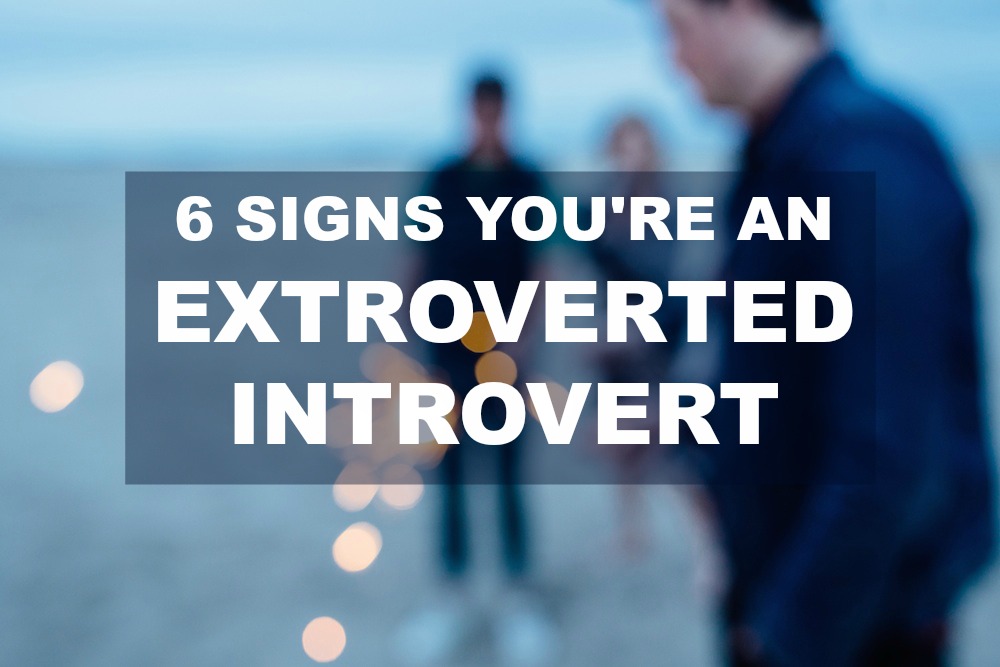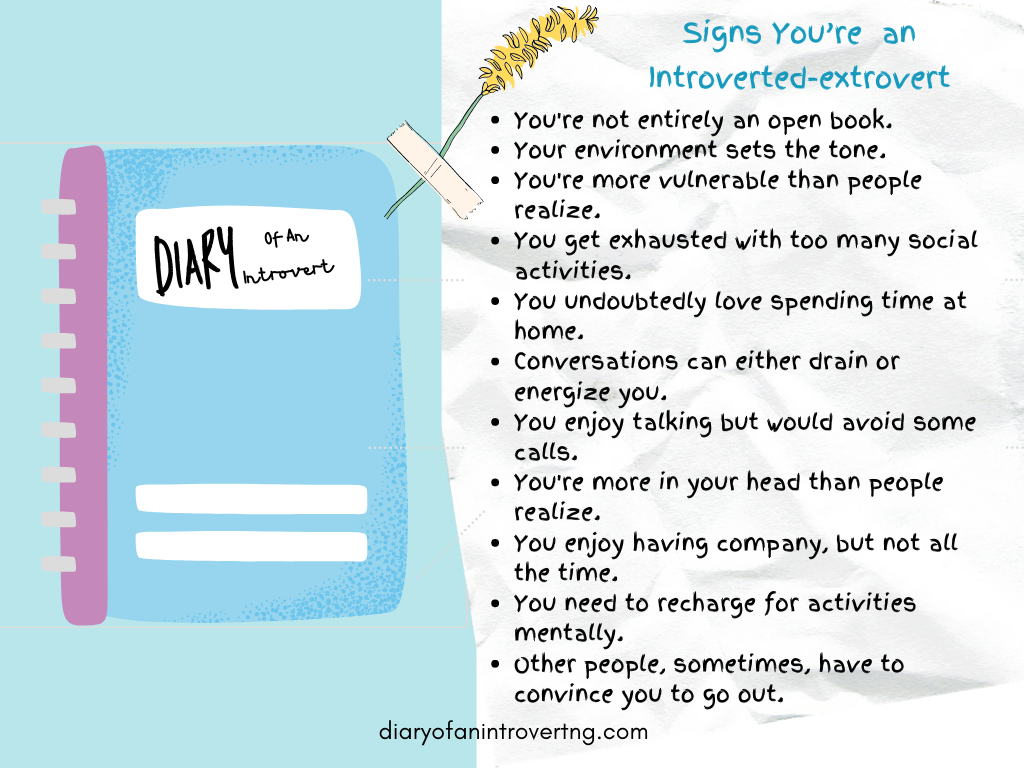Extroverted introvert signs include seeking meaningful connections and needing alone time to recharge. People who exhibit these traits often enjoy socializing in small groups and engage in deep conversations.
They may also have a rich inner world and prefer listening to speaking. These individuals tend to be thoughtful and introspective, and they often feel drained after prolonged social interactions. While they can be outgoing and sociable when needed, they also require ample time alone to process their thoughts and emotions.
Understanding the signs of an extroverted introvert can help in appreciating and respecting their unique personality traits.
The Paradox Of Extroverted Introverts
Unveiling the enigmatic nature of extroverted introverts reveals subtle signs of their complex persona. Balancing social interactions and solitude, they possess a unique blend of outgoing charm and introspective depth. Their ability to adapt to diverse social settings while valuing personal reflection sets them apart in social dynamics.
A Brief Introduction
Extroverted introverts, also known as ambiverts, possess a unique blend of social traits that often perplex others. Despite their reserved nature, they can exhibit outgoing qualities in certain situations, leading to a paradoxical persona that may be hard to comprehend at first glance.
Why The Confusion?
Understanding the paradox of extroverted introverts involves recognizing the intricacies of their behavior. These individuals may enjoy social interactions but also require ample alone time to recharge. This duality can lead to misunderstandings and misconceptions about their true nature.
Trait 1: Social Battery Limitations
Extroverted introverts, also known as ambiverts, possess a unique blend of social tendencies that make their personality a fascinating paradox. While they may exhibit extroverted traits in certain situations, they also have distinct introverted characteristics. One key aspect of their personality is their social battery limitations, which can be explored through two subcategories: being quick to recharge and quick to drain.
Quick To Recharge
Extroverted introverts have the ability to recharge their social batteries relatively quickly. Unlike pure introverts who require extended periods of solitude to replenish their energy, ambiverts can bounce back after social interactions with ease. This means that even after a day filled with meetings, events, or parties, they can find solace in a short period of alone time to regain their energy.
Quick To Drain
On the flip side, extroverted introverts can also become socially drained faster than their purely extroverted counterparts. While they may enjoy socializing and engaging with others, there is a limit to their capacity for prolonged social interactions. This means that they may feel mentally and emotionally exhausted after extended periods of socializing, and require time alone to recharge and regain their equilibrium.
Given their social battery limitations, extroverted introverts are selective when it comes to choosing social gatherings. They prefer quality over quantity, opting for smaller, intimate settings where they can connect with a few close friends or engage in meaningful conversations. This allows them to make the most of their limited social energy and fully enjoy the interactions without feeling overwhelmed.
In conclusion, the trait of social battery limitations defines the unique social tendencies of extroverted introverts. While they can recharge quickly and enjoy socializing, they also have a limited capacity for prolonged social interactions, requiring time alone to recharge. By choosing social gatherings wisely, they can make the most of their social energy and engage meaningfully with others.
Trait 2: Depth Over Breadth In Conversations
Extroverted introverts tend to have meaningful conversations instead of small talk. They are known for their depth over breadth in conversations. They prefer talking about topics that have a deeper meaning rather than just chit-chatting about trivial things.
Craving Meaningful Interactions
Extroverted introverts are not fans of small talk and prefer having deep and meaningful conversations. They crave interactions that have a purpose and add value to their lives. These individuals are known for their thoughtfulness and introspective nature, which makes them great conversationalists when it comes to discussing complex topics.
Disinterest In Small Talk
Small talk can be uncomfortable and draining for extroverted introverts. They don’t find any real purpose in talking about the weather or what they did over the weekend. These individuals prefer to dive deep into a conversation and explore different perspectives on a topic. They find it more interesting to understand the intricacies of a topic rather than just skimming the surface.
Overall, extroverted introverts value meaningful interactions and depth in conversations over small talk. They thrive in settings where they can have thought-provoking discussions with like-minded individuals. If you’re looking for a great conversation partner who can challenge your thinking and offer unique insights, an extroverted introvert is the person to seek out.

Credit: introvertspring.com
Trait 3: Enjoying Solitude
The third trait of an extroverted introvert is enjoying solitude. These individuals value their alone time and often use it to recharge their energy levels. They are not necessarily shy, but they do need time alone to reflect and think.
The Need For Alone Time
Extroverted introverts cherish quiet moments alone to recharge energy.Solitude Vs. Loneliness
Solitude brings peace, while loneliness feels isolating and sad.Key Points: – Extroverted introverts value alone time for self-reflection. – Solitude allows introverts to relax and unwind from social interactions. – Introverts find solace in solitary activities like reading or meditating. – Alone time is essential for introverts to maintain mental well-being.Example: In a world full of noise, extroverted introverts seek solace in solitude.Trait 4: Flexible Social Adaptability
One of the key signs of being an extroverted introvert is the ability to adapt and adjust socially, depending on the situation. This trait, known as flexible social adaptability, allows extroverted introverts to seamlessly navigate different social environments and interact with a diverse range of people.
Adjusting To The Crowd
Extroverted introverts possess the unique ability to adjust their behavior and social approach based on the crowd they find themselves in. Whether it’s a large gathering or an intimate gathering of close friends, they can effortlessly blend in and adapt their communication style to match the energy and dynamics of the group. This chameleon-like quality enables them to feel comfortable and connected, regardless of the social setting.
The Switch Between Extroversion And Introversion
An interesting aspect of flexible social adaptability is the extroverted introvert’s ability to switch between extroversion and introversion as needed. They can tap into their extroverted side when engaging with others, displaying sociability, and participating in group activities. However, they also have the capacity to retreat into their introverted nature, seeking solitude and quiet reflection when necessary. This seamless transition between both ends of the social spectrum allows extroverted introverts to maintain a balanced and fulfilling social life.

Credit: www.happierhuman.com
Trait 5: Emotional Complexity
When it comes to extroverted introverts, emotional complexity is a defining trait. Their ability to navigate a wide range of emotions sets them apart. Let’s delve into the signs that showcase this emotional depth.
Highly Sensitive To Emotions
Extroverted introverts are highly sensitive to the emotions of those around them. This heightened sensitivity allows them to pick up on subtle cues and non-verbal communication, enabling them to connect with others on a deeper level.
Empathy And Understanding
Their empathy and understanding towards others are remarkable. They possess an innate ability to empathize with the emotions of others, often providing comfort and support in times of need.
Trait 6: Unexpected Leadership Skills
Trait 6: Unexpected Leadership Skills – Extroverted Introvert SignsUnveiling the hidden potential within extroverted introverts, trait 6 highlights their surprising leadership abilities. These individuals possess a unique blend of social adeptness and introspective qualities, making them natural-born leaders who excel in guiding and motivating others.
Embracing their innate strengths, extroverted introverts effortlessly inspire and influence those around them.
Leading With Quiet Confidence
Introverted traits can lead to effective leadership through quiet assurance.Influence Without Domination
Extroverted introverts influence without overpowering, fostering collaboration and respect.
Credit: www.diaryofanintrovertng.com
Trait 7: Creative And Reflective
One of the signs of an extroverted introvert is being creative and reflective. This trait often leads to innovative ideas and introspective thinking, making them excellent problem solvers and thoughtful individuals. Their ability to think outside the box and ponder deeply on various matters sets them apart.
The Inner World Of Ideas
Being a creative and reflective extroverted introvert is a unique combination.
It means having a rich inner world filled with innovative ideas and thoughtful reflections.
Creativity In Solitude
In solitude, extroverted introverts thrive in unleashing their creativity.
They find inspiration and recharge their creative energy when alone.
Trait 8: Selective Social Circle
The eighth trait of an extroverted introvert is having a selective social circle. These individuals carefully choose who they spend their time with, preferring quality over quantity in their relationships. They value deeper connections with a few close friends rather than superficial interactions with many acquaintances.
Quality Over Quantity
Extroverted introverts prioritize meaningful relationships over superficial connections.Building Deep Connections
They invest time and effort in fostering strong, long-lasting friendships.Trait 8: Selective Social Circle Extroverted introverts value quality relationships and deep connections.Quality Over Quantity
Extroverts introverts prefer meaningful relationships over superficial connections.Building Deep Connections
They dedicate time and energy to nurturing strong, enduring friendships.Trait 9: Feeling Drained By Networking
Feeling drained after networking is one of the signs of being an extroverted introvert. While they may enjoy socializing, they need time to recharge and can easily become overwhelmed by too much interaction.
The Exhaustion Of Surface-level Interactions
Networking often leads to superficial conversations that drain introverts. These interactions lack depth and authenticity, leaving introverted individuals feeling exhausted.Networking Vs. Genuine Connections
Building real relationships energizes introverted extroverts. Unlike networking, authentic connections provide meaningful interactions that leave them fulfilled.In social settings, introverted extroverts may feel overwhelmed by the energy required to engage in shallow conversations.Trait 10: Unique Approach To Problem Solving
Extroverted introverts possess a unique approach to problem solving that sets them apart. Their ability to blend introspection with action and generate innovative solutions makes them valuable contributors in any team or organization.
Combining Introspection With Action
Extroverted introverts are adept at combining introspection with action, allowing them to carefully analyze a situation before taking decisive steps to address it. This approach enables them to consider multiple perspectives and potential outcomes before implementing a solution.
Innovative Solutions
Extroverted introverts are known for their ability to generate innovative solutions to complex problems. Their knack for thinking outside the box and approaching challenges from unconventional angles often leads to breakthroughs and advancements in various domains.
Understanding And Embracing Your Extroverted Introvert Nature
Embracing your extroverted introvert nature involves recognizing signs like enjoying socializing but needing downtime. Understanding these traits helps you navigate social situations with ease and honor your need for solitude. Balancing both aspects leads to a fulfilling and authentic life.
Understanding and Embracing Your Extroverted Introvert NatureNavigating the Social WorldBeing an extroverted introvert can sometimes feel like a paradox. While you may enjoy socializing and being around others, you also need time alone to recharge and process your thoughts. Navigating the social world can be challenging, but understanding your extroverted introvert nature can help you find a balance that works for you.To navigate the social world as an extroverted introvert, it’s essential to recognize your limits and set boundaries. This means understanding when you need to step back and take time for yourself, even if it means saying no to social events. It’s okay to prioritize your own well-being and recharge your energy when needed.Leveraging Your Unique TraitsAs an extroverted introvert, you possess unique traits that can be leveraged to your advantage. One of these traits is your ability to connect with people on a deeper level. While you may not thrive in large social gatherings, you excel in one-on-one conversations where you can truly listen and empathize with others.Another trait that sets you apart is your ability to adapt to different social situations. You have the versatility to be outgoing and sociable when needed, but also have the introspective nature to reflect and analyze situations. This allows you to bring a unique perspective to discussions and problem-solving.Additionally, extroverted introverts often excel in leadership roles. Your ability to understand and connect with people, combined with your introspective nature, allows you to lead with empathy and authenticity. You can create a supportive and inclusive environment for your team, encouraging collaboration and personal growth.In conclusion, understanding and embracing your extroverted introvert nature can lead to a more fulfilling and balanced social life. By navigating the social world with awareness of your limits and leveraging your unique traits, you can thrive both in social settings and in your personal growth journey. Embrace your extroverted introvert nature and let your authenticity shine through.Frequently Asked Questions
How Do I Know If I’m An Extroverted Introvert?
You might be an extroverted introvert if you enjoy socializing but also need alone time. You may feel comfortable in social situations but also need time to recharge by yourself. This combination of traits is common in extroverted introverts.
What Is The Personality Of An Extrovert Introvert?
An extrovert introvert is a person who exhibits both extroverted and introverted traits. They may enjoy socializing but also need time alone to recharge. Their personality can be described as adaptable, versatile and introspective. They are good listeners and can be sensitive to others’ needs, but also assertive when necessary.
What Is An Extroverted Introvert Called?
An extroverted introvert is commonly referred to as an ambivert. It is someone who possesses both extroverted and introverted qualities, enjoying social interactions but also needing alone time to recharge. Ambiverts strike a balance between being outgoing and reserved.
Which Personality Types Are Extroverted Introverts?
Extroverted introverts can be any personality type, but they lean towards being more reserved. They enjoy socializing but also need alone time to recharge. These individuals may be classified as ambiverts, having qualities of both extroversion and introversion.
Conclusion
Being an extroverted introvert can be a challenging but rewarding experience. If you identify with the signs listed in this post, know that you are not alone. Embrace your unique personality and find ways to balance your need for social interaction with your need for solitude.
Remember to communicate your needs to others and prioritize self-care to maintain a healthy mental state.



